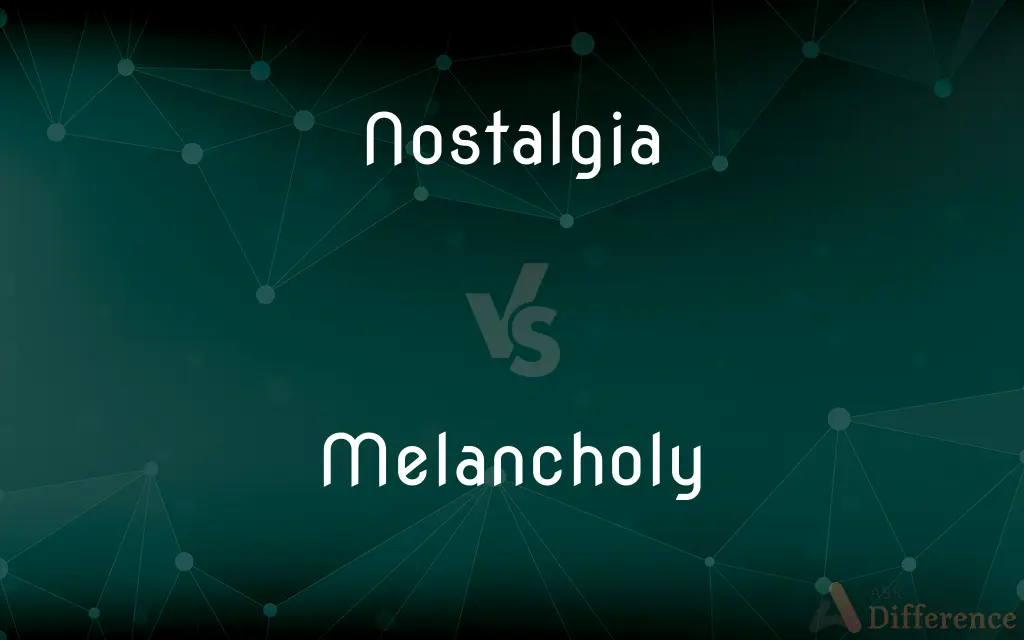Nostalgia vs. Melancholy — What's the Difference?
By Maham Liaqat & Fiza Rafique — Updated on April 21, 2024
Nostalgia refers to sentimental longing for the past, often with fond memories, while melancholy denotes a deeper, pensive sadness without a specific cause.

Difference Between Nostalgia and Melancholy
Table of Contents
ADVERTISEMENT
Key Differences
Nostalgia evokes a wistful pleasure from memories of past events or eras, often tinged with a bittersweet sentiment. In contrast, melancholy involves a lingering sadness or solemn contemplation that might not be tied to specific memories or experiences.
Nostalgia often brings smiles and a warm feeling as individuals remember "the good old days," whereas melancholy might not be associated with positive feelings and could lead to introspection or existential reflection.
While nostalgia can be triggered by sensory experiences such as smells, sounds, or sights that recall the past, melancholy is often more pervasive and can be induced by a broader range of existential thoughts or emotional states.
Nostalgia is typically shared and discussed with others, celebrating past experiences collectively, while melancholy tends to be a more private, isolative experience, reflecting personal sorrow or deep thoughts.
Both nostalgia and melancholy can affect mood and perspective on life, but nostalgia is usually uplifting or comforting, whereas melancholy can be burdensome or inhibiting.
ADVERTISEMENT
Comparison Chart
Definition
A sentimental longing for the past.
A deep, persistent sadness.
Emotional Tone
Generally positive and wistful.
Generally somber and introspective.
Trigger
Specific past memories or eras.
Broad, often undefined emotional state.
Social Context
Often shared in social settings.
Typically a solitary experience.
Psychological Impact
Can boost mood and bring comfort.
May lead to depression or withdrawal.
Compare with Definitions
Nostalgia
A bittersweet emotion where the past is romanticized.
His nostalgia for the golden days masked the hardships they endured.
Melancholy
A disposition toward being somber or mournful.
He had a melancholic temperament that made him profoundly insightful.
Nostalgia
A longing for the past, typically for a period or place with happy personal associations.
Nostalgia swept over him as he looked through the photo album.
Melancholy
Reflective sadness or a gloomy state of mind.
She walked the beach in a melancholy mood, contemplating the changes in her life.
Nostalgia
Emotional state arising from memories of well-loved experiences or associations.
The 90s music festival was designed to evoke nostalgia among its attendees.
Melancholy
A feeling of pensive sadness, typically with no obvious cause.
A sense of melancholy descended on him during the long winter nights.
Nostalgia
Fondness for the past often accompanied by sadness for its passing.
As the years passed, her nostalgia for college days only grew stronger.
Melancholy
A deep, emotional state that is less intense than sorrow but more pervasive than sadness.
The melancholy mood of the painting was conveyed through its dark colors.
Nostalgia
A sentimental yearning for the happiness of a former place or time.
She felt a wave of nostalgia walking through her old high school.
Melancholy
A philosophical or thoughtful sadness.
The novel captured the melancholy of existential questioning.
Nostalgia
Nostalgia is a sentimentality for the past, typically for a period or place with happy personal associations. The word nostalgia is learned formation of a Greek compound, consisting of νόστος (nóstos), meaning "homecoming", a Homeric word, and ἄλγος (álgos), meaning "pain" or "ache", and was coined by a 17th-century medical student to describe the anxieties displayed by Swiss mercenaries fighting away from home.
Melancholy
A feeling of pensive sadness, typically with no obvious cause
He had an ability to convey a sense of deep melancholy and yearning through much of his work
An air of melancholy surrounded him
At the centre of his music lies a profound melancholy and nostalgia
Nostalgia
A bittersweet longing for things, persons, or situations of the past.
Melancholy
Having a feeling of melancholy; sad and pensive
She felt a little melancholy
A dark, melancholy young man with deep-set eyes
Nostalgia
The condition of being homesick; homesickness.
Melancholy
Sadness or depression of the spirits; gloom.
Nostalgia
A longing for home or familiar surroundings; homesickness.
Melancholy
Pensive reflection or contemplation.
Nostalgia
(transferred sense) A bittersweet yearning for the things of the past.
Melancholy
Black bile.
Nostalgia
Homesickness; esp., a severe and sometimes fatal form of melancholia, due to homesickness.
Melancholy
An emotional state characterized by sullenness and outbreaks of violent anger, believed to arise from an excess of black bile.
Nostalgia
A sentimental yearning to return to an earlier time remembered as happier or more pleasant, or a former place evoking happy memories; a longing to experience again a former happy time; as, a nostalgia for the brotherhood of the Woodstock music festival; a nostalgia for the comradeship of one's college friends.
Melancholy
Feeling, showing, or expressing depression of the spirits; sad or dejected.
Nostalgia
Longing for something past
Melancholy
Causing or tending to cause sadness or gloom
A letter with some melancholy news.
Melancholy
Pensive; thoughtful.
Melancholy
(historical) Black bile, formerly thought to be one of the four "cardinal humours" of animal bodies.
Melancholy
Great sadness or depression, especially of a thoughtful or introspective nature.
Melancholy
(literary) Affected with great sadness or depression.
Melancholy people don't talk much.
Melancholy
Depression of spirits; a gloomy state continuing a considerable time; deep dejection; gloominess.
Melancholy
Great and continued depression of spirits, amounting to mental unsoundness; melancholia.
Melancholy
Pensive maditation; serious thoughtfulness.
Melancholy
Ill nature.
Melancholy
Depressed in spirits; dejected; gloomy dismal.
Melancholy
Producing great evil and grief; causing dejection; calamitous; afflictive; as, a melancholy event.
Melancholy
Somewhat deranged in mind; having the jugment impaired.
Melancholy
Favorable to meditation; somber.
A pretty, melancholy seat, well wooded and watered.
Melancholy
A feeling of thoughtful sadness
Melancholy
A constitutional tendency to be gloomy and depressed
Melancholy
A humor that was once believed to be secreted by the kidneys or spleen and to cause sadness and melancholy
Melancholy
Characterized by or causing or expressing sadness;
Growing more melancholy every hour
Her melancholic smile
We acquainted him with the melancholy truth
Common Curiosities
What is an example of melancholy in literature?
Many Romantic poets, such as Keats, often explored themes of melancholy in their works.
Can nostalgia be negative?
While generally positive, nostalgia can sometimes lead to sadness over the unattainable past.
How do people typically express nostalgia?
People often express nostalgia by reminiscing or engaging with cultural artifacts from the past.
How can one alleviate feelings of melancholy?
Engaging in meaningful activities and connecting with others can help alleviate melancholy.
What causes nostalgia?
Nostalgia is triggered by memories that are associated with happy times from the past.
Is melancholy always related to depression?
Melancholy involves sadness but isn't always clinical depression, though it can be a symptom.
Are children affected by nostalgia?
Children can feel nostalgia, often triggered by smells, sounds, or sights reminiscent of earlier childhood.
Does melancholy have any benefits?
Philosophically, melancholy can deepen one’s appreciation for life's complexities and enhance artistic creativity.
Can melancholy be a personality trait?
Yes, some individuals may have a melancholic disposition, making them more prone to reflective sadness.
What are the physical expressions of nostalgia?
Nostalgia often involves smiling, laughter, or a warm expression when sharing memories.
Share Your Discovery

Previous Comparison
Lignin vs. Cellulose
Next Comparison
Arithmetic vs. AlgebraAuthor Spotlight
Written by
Maham LiaqatCo-written by
Fiza RafiqueFiza Rafique is a skilled content writer at AskDifference.com, where she meticulously refines and enhances written pieces. Drawing from her vast editorial expertise, Fiza ensures clarity, accuracy, and precision in every article. Passionate about language, she continually seeks to elevate the quality of content for readers worldwide.
















































